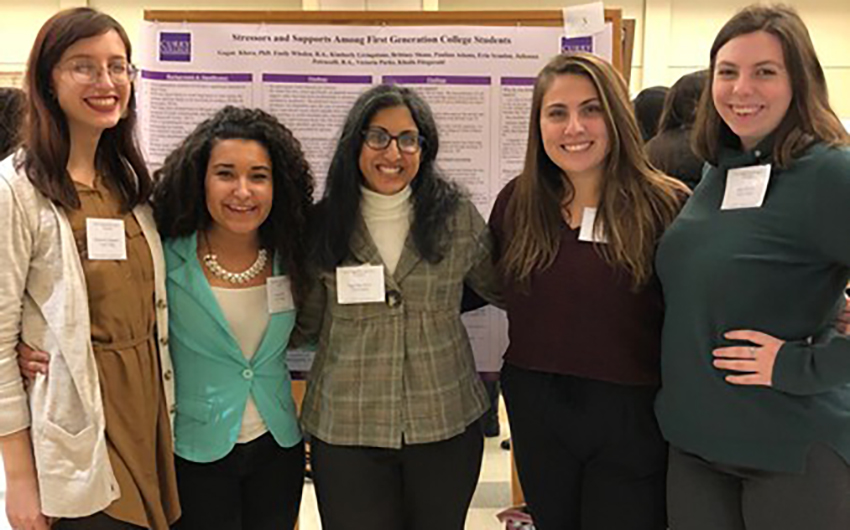
TOPICS:
"Look for the helpers. You will always find people who are helping.” Many have been comforted and inspired by these famous words from the television icon, Mr. Fred Rogers. But in Curry College’s Psychology department, Dr. Gagan “Mia” Khera doesn’t just look for the helpers. She creates them.
In her new journal article, “Barriers to mental health service use in Asian American and European American college students,” Dr. Khera examines how young adults ask for help when experiencing mental health challenges or problems related to emotions and feelings. The article evaluates cultural norms that present barriers to seeking treatment, such as negative attitudes about mental health, cost, and convenience.
Dr. Khera, a licensed clinical psychologist, co-authored the article with academics from The George Washington University, where she received her Ph.D. “Dr. Christina Gee was starting a research project examining help-seeking behaviors. I wanted to get involved because much of my clinical work and teaching centered around encouraging young people to ask for help, and to help them work through barriers,” says Dr. Khera.
The new research tops a tall list of notable publications, speaking opportunities, and industry collaborations for the psychology professor who has served as chairperson of the Executive Committee for the Division of South Asian Americans of the Asian American Psychological Association. Most recently, the American Psychological Association recently selected Dr. Khera for its 2020 Leadership Institute for Women in Psychology program.
Though an accomplished academic scholar, research scientist, and clinical psychologist, Dr. Khera’s role as an educator is the closest to her heart, and a passion she discovered early in her career as a first-grade teacher with Teach for America.
“I love teaching. I love sharing my excitement and curiosity about psychology and the world around us,” says Dr. Khera. “So much of what motivates people or underlies their actions and beliefs are studied in psychology. But teaching for me goes beyond the classroom - it involves mentoring and advising that allows me to understand my students' lives and experiences better. What I love most about teaching at Curry is the sense of community I have with my advisees and students.”
Teaching both introductory and advanced courses, including Introduction to Clinical and Counseling Psychology, Internship Seminar, Adolescent Development, and Multicultural Psychology, Dr. Khera describes her approach to working with students as “honest” and “real” and adapts her courses to their career interests and future work as “helpers.”
“I want my students to know that curiosity and compassion are important if you are going to be a helper in this world, and that change starts with all of us - advocating for our clients, advocating for those who do not have a voice, asking for help for ourselves is the first sign of being a leader and that we are all lifelong learners,” she says. “Of course, I want them also to take away the important content they learn, but these underlying messages are important because many of our students want to help others and go on to be counselors, therapists, and social workers.”
On top of building mentorships and a close classroom community, Dr. Khera is also excited to further her research interests and allow students an opportunity to gain real research experience. Most recently, Dr. Khera and a group of psychology students conducted research examining the help-seeking behaviors of first-generation college students and presented the findings at the New England Psychological Association conference as well as the Diversity Challenge conference held at Boston College.
“It was fun to take students to conferences and mentor them in the professional environment and watch them present the findings to attendees. This research also informs my teaching, which is a win-win!”
Graduates with a degree in Psychology from Curry College go on to work in a variety of roles – from human services to health care, from counseling to crisis intervention, from business to education, from public relations to law, from advertising to child care, from human resources to marketing, and so many more.